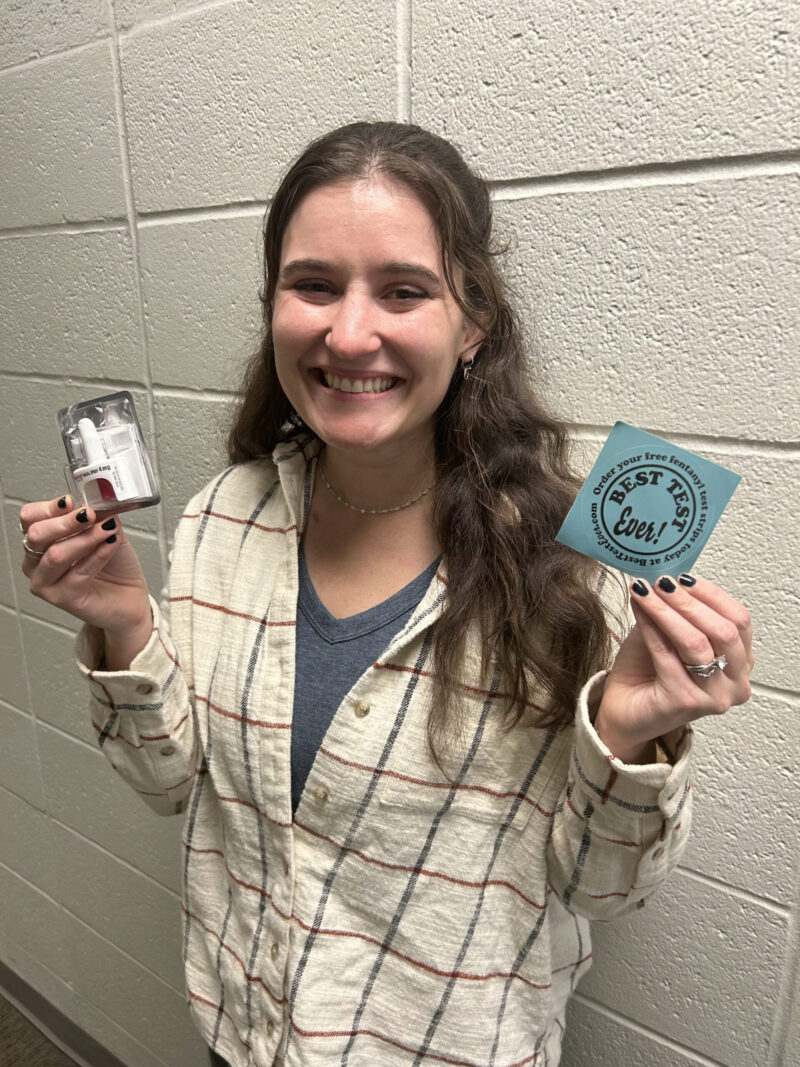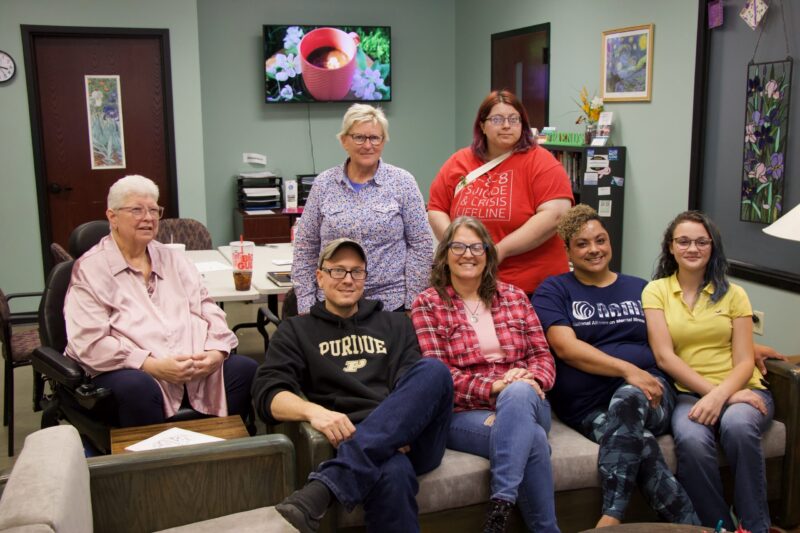Impact from Purdue Master of Public Health alumna still felt in community years after her graduation

Purdue University Master of Public Health Alumna Nicki Cochran (’21) is the research and program evaluation director at Overdose Lifeline in Indianapolis today, but her work for Lafayette’s chapter of the National Alliance of Mental Illness (NAMI) is still being felt and appreciated today.
Written by: Tim Brouk, tbrouk@purdue.edu
Two years after her internship and Purdue University graduation, Nicki Cochran’s name still echoes joy in the halls of the West Central Indiana office of the National Alliance of Mental Illness (NAMI) in Lafayette.
Sheri Moore, executive director of the agency that specializes in helping community members struggling with various forms of mental illness, put it succinctly: “We wouldn’t be sitting here if it wasn’t for her.”
Cochran brought a skillset to her summer 2021 Master of Public Health (MPH) internship at the local NAMI office. It included top notch professional writing and business sense along with her passion for helping those suffering from mental health issues. After her December 2021 graduation, the Indianapolis native penned a grant proposal and business plan for the then-small NAMI facility. A year later, the agency she worked in two days a week earned a $1.28 million Community Catalyst Grant from the Indiana Division of Mental Health and Addiction. The money allowed the expansion of the office space, the tripling of Moore’s staff from four to 12 employees and the development of The Living Room, an area where community members experiencing mental illness crises can rest, recharge and talk to peers. The Living Room is a first of its kind in Indiana.
“It was actually the first grant that I ever wrote. I’m very proud of it,” revealed Cochran. “I was just floored (when she heard the grant came through). It all became real.”
While she works as research and program evaluation director at Overdose Lifeline in Indianapolis today, Cochran is still connected to NAMI. She attended The Living Room’s Aug. 29 grand opening and has enjoyed watching the office’s growth in reach. Since its May 1 soft opening, The Living Room has hosted and helped 62 different guests through Oct. 1.
“It’s a very warm space. When you go in, it does feel like It’s a living room,” Cochran said. “I am a person with lived experience with mental health. It’s impacted me almost my entire life and I, myself, have had crises that I didn’t have somewhere to go to. I was fortunate enough to grow up having resources available to me, but a lot of people don’t have those resources because of the financial barriers associated with mental healthcare. So, just working on and helping out with something that I could have used as a teenager and a young adult was my inspiration for it.”
Since Moore’s NAMI office operates exclusively on grants, donations and fundraisers, the grant Cochran wrote will be remembered for many years to come. The funds helped grow the agency’s programmatic options, most of which led by those new hires as well as volunteers and “peers,” those that have experienced mental health issues and want to help others. There are crafts, a walking club, support groups and a stretching class. Mondays are cards and boardgame days.
The staff members are trained to help and talk to those that come into The Living Room, either on their own volition or dropped off by police. While the guests’ mental health is priority one, The Living Room allows them a safe space that isn’t a costly hospital stay or jail cell if they are having suicide ideation, crippling anxiety or a paranoid psychotic break. They can talk things out or just rest with a cup of coffee and a snack.
“The original idea was to give police a place to drop them off and we can help deescalate,” said Moore, who welcomed her first Purdue Master of Public Health interns the semester before Cochran’s and has worked with others since. “It’s how we treat people. NAMI CEO Dan Gillison Jr. likes to say, ‘A mental health crisis deserves a mental health response.’”
Today, Cochran advises a huge undertaking in analyzing the distributing fentanyl and naloxone test strips for other dangerous drugs throughout the state for free. The project is in partnership with the state of Indiana’s Division of Mental Health and Addiction and the Governor’s Office. She is also involved in research at Overdose Lifeline. One project delves into the disparity of overdose death rates in black communities in Indianapolis and another looks at maternal substance use disorder and what recovery looks like for mothers and their children.
Cochran still uses methods — and even textbooks — from her time in the College of Health and Human Sciences as well as the lessons learned helping grow her local NAMI.
“It was incredible,” Cochran said. “I am proud of the work that I did to help them get started, but here’s the hard part, where you’re actually in action and helping people and troubleshooting all of the things that come up because this work is not clean cut; it’s hard work. So, finding a path toward financial sustainability and continuing to serve their community, that’s my goal for them.”

Sheri Moore, executive director of Lafayette’s NAMI and middle second row, poses with some of her staff and peers. Thanks to Cochran’s efforts as an intern, Moore was able to triple her staff.Tim Brouk
Discover more from News | College of Health and Human Sciences
Subscribe to get the latest posts to your email.